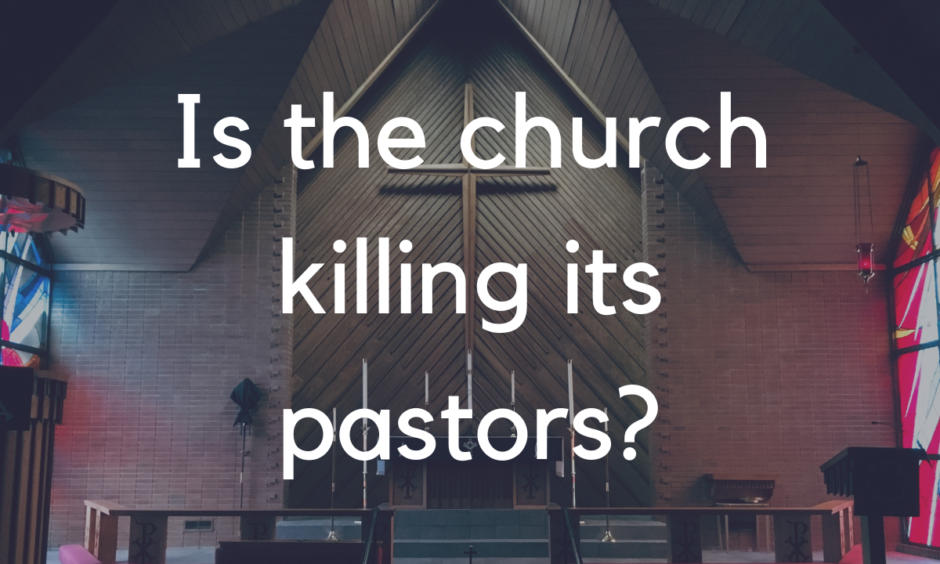Another mega-church pastor dead by suicide. Odds are if you’re a Christian you’ve probably seen the news that Jarrid Wilson, pastor of Harvest Christian Fellowship, committed suicide a few days ago. Heart wrenching news, but sadly nothing revolutionary. About this time last year Andrew Stoecklein, pastor of another large church comitted suicide as well. And there have been plenty of other pastors who have done the same between Andrew and Jarrid’s deaths that didn’t gain the same amount of traction in the news or on social media.
Tragic suicides like Jarrid Wilson’s are a reminder of the dismal state of the mental and emotional health of most of those in the pastorate. Take a look.
Pastors and mental health
Most of the of following are from the CRCNA Network unless otherwise noted:
- The number of pastors diagnosed with clinical depression was double the national average.
- 70% constantly fight depression (Soul Shepherding)
- Forty five percent sought advice from their family doctor regarding stress and anxiety issues.
- Nearly one-fourth of all pastors (23 percent) acknowledge having “personally struggled with mental illness,” and half of those pastors say the illness has been diagnosed. (LifeWay Research)
- Not surprisingly, pastors accede to their own and to their congregations’ demands to perform, neglecting time for self-care and for their own faith nurture.
- On average, pastors surveyed are working 50 hours a week. A quarter of them work more than 55.
- Nearly 40 percent take fewer than three days off per month.
- Many ministers neglect regular exercise, personal devotions, and relaxation to find more time for serving or to avoid feeling guilty.
- Ninety four percent of pastors said that although they read Scripture to prepare sermons, it rarely nourishes them personally. (Centre for Clergy Care)
- 80% will not be in ministry ten years later and only a fraction make it a lifelong career. On average, seminary trained pastors last only five years in church ministry. (Soul Shepherding)
What’s the problem?
With each pastoral suicide over the last couple years I’ve observed commentary and conversation about the need for leaders, particularly those in the church world, to be more open about mental health issues, and several articles of pastors coming forward to share about their own anxiety, depression, and struggles. Good and healthy stuff. But will simply talking more about mental health and removing some of the associated stigma in the Christian culture solve the problem? I don’t think so. It may be a positive step, but it’s treating a symptom rather than addressing the root cause.
Depression, anxiety, and the constellation of other issues that generally lead to suicide are all human issues. Ultimately they are rooted in our beliefs and how we embody those beliefs about who we are and what we are to do. But we humans – pastors and church leaders are no exception – operate inside institutional structures that have massive impact on those human issues. Our environments shape us, and the reality is that the structure of the modern church has created an environment that is increasingly detrimental and, for many like Andrew and Jarrid, even deadly.
Please note, as I lay out the following I am in no way minimizing the reality that we have personal responsibility for our actions. Yes, pastors struggling with suicidal thoughts and depression need to take action to get treatment, support, and care to move towards healthy. However, we have a significant responsibility to ensure that the structures that we are a part of aren’t unduly hindering that health.
The crushing expectations on a modern pastor
Sometime last year I had a conversation with an older couple who’ve been in ministry for decades about the expectations on them as a pastor and his wife. They were absolutely adamant that the congregation they led required the pastor to be “above it all” and not reveal any marital conflict, depression, or anything that might lower their view of him. The pastor, their words implied, is meant to fulfill the common ideal image of what a Christian ought to be: someone without any notable sin or struggle, devoted to God and his Word, and holding it all together by the grace of God.
Sorry (not sorry), but that’s bullshit. Deadly bullshit.
By that attitude – and it’s a common one – to be a pastor in a church – particularly a large or mega-church – is to be subject to incredibly crushing expectations. The modern pastor must be an incredible public speaker, a counselor, more holy than the rest of the congregation, missional, supremely knowledgeable and able to address thorny theological issues with care and nuance, deal with endless relational conflict, be able to operate as the CEO of a massive organization, and much more.
This mindset on the part of the congregation is, unequivocally, sin. If you have an expectation that your pastor be a better person than you or somehow closer to God than you, you’re in the wrong and are abdicating your role as one of the members of a nation of priests. Jesus’ words in Matthew 23:8-9 are definitive and hard push against the modern expectations on pastors:
“But you are not to be called rabbi, for you have one teacher, and you are all brothers. And call no man your father on earth, for you have one Father, who is in heaven. Neither be called instructors, for you have one instructor, the Christ. The greatest among you shall be your servant. Whoever exalts himself will be humbled, and whoever humbles himself will be exalted.”
Does the structure of your church communicate that those on staff in pastoral roles are brothers, on equal footing with even those newest in faith? If it’s like most churches today, probably not even close.
Being a pastor is killer
The average church building’s physical structure communicates that the pastor is above the people and not one of them. The pastor and other leaders walk up onto a stage that’s raised above the congregation, separating themselves from them. The weekly 30-50 minute long sermon at most churches communicates an expectation that the pastor is the one who’s expected to have answers – to be the rabbi and instructor for their congregation. The adoption of modern business practices in most churches means most senior pastors also function as CEOs expected to keep the organization going, offering visionary leadership and declarative guidance for the staff and the congregation.
All of this is a not-so-subtle statement that the pastor is expected to function as the priest/savior and play the go between between the congregation and God. This structural reality drives even the most steady, mature follower of Jesus to carry a massive weight that shouldn’t be their to carry. That weight drives many pastors to find relief, generally in hidden sin. Porn, alcohol, affairs, even suicide.
Where the church Jesus envisioned was meant to be a community of people journeying together and supporting each other as they followed their savior on mission, what we’ve built in the modern church is more akin to wheeled cart, the congregation sitting inside while the pastoral staff and a select few others strive to push and pull the rest toward their goal. The conversation about removing the stigma of mental illness and pastors getting counseling and the like is the equivalent of people encouraging those pulling the cart to be more honest about how tired and worn out they are but making no move to help bear the weight. While good and possibly helpful, it’s not going to solve the problem. The problem is the fact that we’ve built a cart in the first place.
Jesus’ light yoke
I know very few pastors who would say that their yoke is light. Yet Jesus makes the amazing declaration that his burden is easy and his yoke light. Was he lying, or are we simply doing it wrong?
Jesus and his apostles set a stunning example of being broken-hearted but joyful. Giving themselves over to a form of dying for the sake of those they led but always finding life in Christ. The structure of the early church wasn’t one of large organizations with pastors bearing the weight of their congregation. It was one of a community of people journeying together and supporting each other as they followed their savior on mission. The weight fell on the entirety of the community rather than on one or two individuals, though there were clearly those who took the lead.
I truly believe that if we operated closer to the biblical picture of the church, pastors would find their burdens lightened greatly and we would see a marked decrease in mental health issues among clergy. Pastors would be released to walk in the joy of their calling as fellow heirs and a part of the kingdom of priests, with Jesus as the high priest (not them!) who bears the weight.
Yes, pastors need to mature and not accept the mantle of savior or buy into the lies that they carry the weight of their church. But we must also consider the inherent brokenness of a church structure that exalts some of Jesus’s disciples over others. “You are all brothers,“ Jesus said. Let’s make sure that our churches operate in a way that affirms that reality.
How practically could the structure of the church of the church be changed to facilitate this? I’ll outline a few ideas in my next post.





No Comments